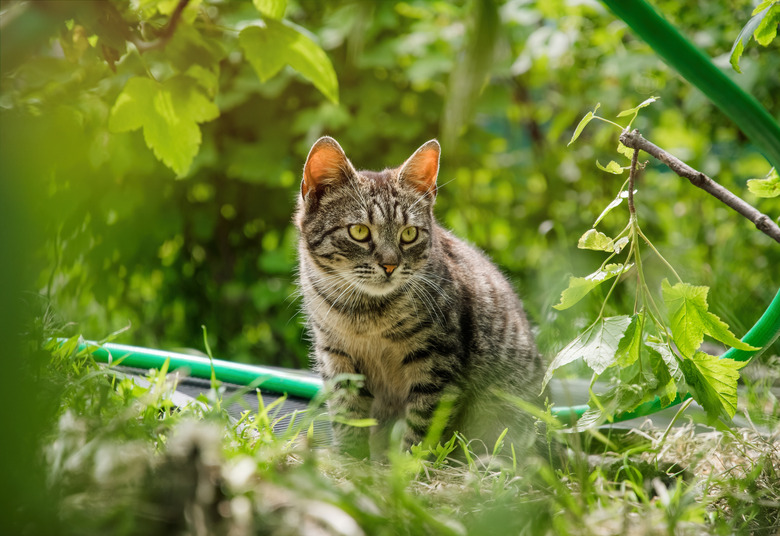How To Make Cats Stop Pooping In Flower Beds And Gardens
If you imagine life as a cat, it isn't hard to see the world as a playground and every mound of dirt a potential litter box. Whether or not you like cats, you probably don't want them scrounging around and making a mess in your garden. There are many safe deterrents that discourage felines from exploring your plants.
Finding the best cat repellent
Finding the best cat repellent
The solution to discouraging cats from defecating on your outdoor plants may be as simple as making your garden unappealing to wandering felines. Cats aren't lovers of water, so a motion-activated sprinkler may keep felines away. Additionally, ultrasonic devices that emit a high-pitched sound can be great cat deterrents.
These items can be concealed in foliage or used as garden decor. Newly planted foliage is especially vulnerable to cats since felines are drawn to fresh dirt. Consider protecting fresh plantings with fine netting or by laying chicken wire directly onto the soil. Plants can still grow through it. Another option is to use mesh vegetable bags from your grocer, but if you go this route, make sure they are secured so they don't end up blowing away as litter and endangering animals in the wild.
Placing prickly items, like pine cones or mounding pea gravel, around plantings won't cause cats any harm, but these ground covers aren't as kind to paws as a freshly tilled mound of dirt. Cats love to dig, so pressing popsicle sticks or plastic forks into the soil around your plantings might be enough of a deterrent to encourage them to do their digging elsewhere.
Natural deterrents for cats
Natural deterrents for cats
A look into your cupboard might reveal some natural cat deterrents. Cats aren't fond of citrus, so consider placing orange or lemon peels around your garden area. Coffee grounds might also cause the neighborhood felines to turn up their nose, as may red pepper. A good rain will wash away the coffee and pepper and cause the citrus to lose its scent, so replace these frequently if you find that they're working.
The scent of vinegar is a natural cat deterrent. Dilute and add vinegar to rags and scatter them through your garden to discourage cats from digging or defecating there. You can also make homemade cat repellent spray using dried mustard, cayenne pepper, and various essential oils.
Things you find outside can also work well as cat deterrents. Branches and sticks can be arranged to protect your plants. In addition, river rocks can be a good option to deter community cats from your garden. Not only will they prevent them from digging up your plants but they will also prevent weeds from growing.
Best plants for cat repellent
Best plants for cat repellent
Certain plants act as a deterrent for felines who might want to do their business in your garden. Rue, lavender, lemon balm, pennyroyal, Coleus canina, and lemon thyme are plants that cats find unappealing.
Plant them throughout your garden and plant other foliage and flowers close together to limit the fresh soil available for digging.
Store-bought cat repellent
Store-bought cat repellent
Commercial products are included among the best cat repellents. When sprayed in your garden area, these may deter neighborhood cats from turning your yard into a community litter box. Check with your local nursery or retail plant provider to make sure these deterrents will not damage your plants or soil.
Purchasing a cat shelter is another option, which will give the felines their own space for protection from the elements and in turn keep them away from your garden and flower beds. You can also create an outdoor litter box for community cats using wood frames filled with sand or peat moss. Note that clay cat litter should not be used in outdoor litter boxes.


